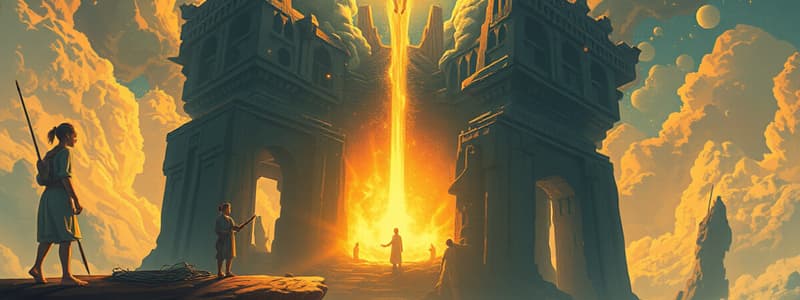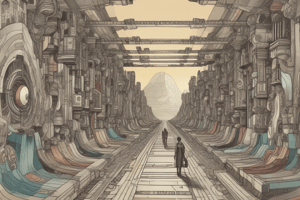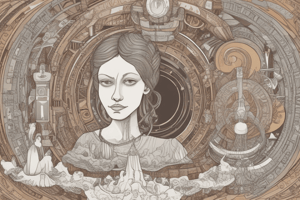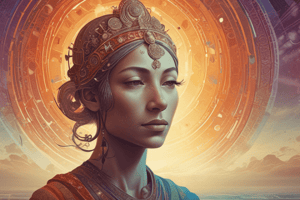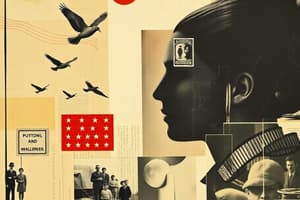Podcast
Questions and Answers
What is cultural construction?
What is cultural construction?
- People's beliefs about reality are largely constructed by their culture. (correct)
- Absolute truths that transcend culture.
- Physical traits that define race.
- Inherent qualities of symbols.
How do cultural constructions affect our thoughts, feelings, and beliefs?
How do cultural constructions affect our thoughts, feelings, and beliefs?
Cultural constructions affect our thoughts, feelings, and beliefs through concepts like gender, art, and beauty.
How does cultural relativism relate to cultural constructions?
How does cultural relativism relate to cultural constructions?
Cultural relativism allows us to understand that constructions are relative to their circumstances.
What is the difference between cultural and moral relativism?
What is the difference between cultural and moral relativism?
What do anthropologists mean when they say that race is a cultural construction?
What do anthropologists mean when they say that race is a cultural construction?
What evidence do anthropologists use to support the idea that race is a cultural construction?
What evidence do anthropologists use to support the idea that race is a cultural construction?
What are norms?
What are norms?
What are folkways?
What are folkways?
What are mores?
What are mores?
What are symbols?
What are symbols?
What are values?
What are values?
What does arbitrary mean in this context?
What does arbitrary mean in this context?
What does conventional mean?
What does conventional mean?
What is multivocality?
What is multivocality?
What does condensation in symbols refer to?
What does condensation in symbols refer to?
What are classifications of reality?
What are classifications of reality?
What is a worldview?
What is a worldview?
What is the cultural construction of gender?
What is the cultural construction of gender?
What are multiple-gender identities?
What are multiple-gender identities?
Knowledge = _____ and/or _____ + their ________.
Knowledge = _____ and/or _____ + their ________.
Why is 'relationship' essential to the meaning of knowledge?
Why is 'relationship' essential to the meaning of knowledge?
Why are names and terms important?
Why are names and terms important?
Why are diagrams considered distilled knowledge?
Why are diagrams considered distilled knowledge?
The three categories of relationship are ________, ________, and ________.
The three categories of relationship are ________, ________, and ________.
What is the connection between cultural construction of relationships and knowledge?
What is the connection between cultural construction of relationships and knowledge?
Why is knowledge power?
Why is knowledge power?
Flashcards are hidden until you start studying
Study Notes
Cultural Construction
- Cultural construction refers to the idea that individuals’ beliefs and perceptions of reality are shaped by their cultural backgrounds.
- This concept challenges the notion of an objective reality, emphasizing the influence of culture on personal expression, values, and expectations.
Impact on Thoughts and Feelings
- Cultural constructions shape our understanding of gender, beauty, and art, significantly influencing emotions and beliefs.
Cultural Relativism
- Cultural relativism posits that people's constructions of reality are context-dependent; understanding these constructions requires knowledge of their cultural circumstances.
Cultural vs. Moral Relativism
- Cultural relativism focuses on understanding reality in its specific context, while moral relativism claims all judgments are ethnocentric, with no universal standard for morality.
Race as a Cultural Construction
- Anthropologists argue race is a cultural rather than a biological construct, highlighting that human classifications into racial categories are socially determined rather than based on innate differences.
Evidence for Race as Cultural Construction
- Different criteria can create various racial classifications; no objective method exists to determine racial categories, leading to cultural variability in racial identification.
- Example: Brazil has over 40 terms for race, reflecting diverse cultural perceptions.
Norms
- Norms represent shared expectations regarding behavior in specific situations, setting standards for propriety and appropriateness.
Folkways
- Folkways are norms governing everyday behavior, focusing on standards of polite conduct without strong moral implications.
Mores
- Mores are norms with moral significance, reflecting societal views on right and wrong behavior, especially regarding issues like sexuality.
Symbols
- Symbols have meanings that are culturally defined and do not possess inherent qualities; they represent conventional interpretations of various behaviors and objects.
Values
- Values encompass shared beliefs about what goals and lifestyles are deemed worthwhile within a culture.
Arbitrary and Conventional Meanings
- Symbols are arbitrary, meaning their significance is not derived from inherent qualities, but rather from collective agreement on their meanings.
Multivocality
- Symbols can convey multiple meanings or qualities simultaneously, representing complex ideas and values.
Condensation
- Symbols can simplify complex ideas into recognizable forms, facilitating emotional connections and easier comprehension.
Classifications of Reality
- Cultures categorize their social and natural environments through linguistic constructs, creating unique interpretations of reality.
Worldview
- A worldview shapes how individuals interpret events and realities, influencing their connection with the surrounding world.
Cultural Construction of Gender
- Gender characteristics are attributed culturally rather than biologically, reinforcing societal norms around masculinity and femininity.
Multiple-Gender Identities
- Some cultures recognize more than two gender identities, allowing for a broader spectrum beyond just male and female.
Components of Knowledge
- Knowledge consists of ideas, objects, and their relationships, where understanding these connections is crucial for meaningful knowledge.
Importance of Relationships in Knowledge
- Relationships are essential as they provide context to ideas and objects, contributing to a deeper understanding of knowledge.
Role of Names and Terms
- Names and terms are vital for articulating knowledge, enabling effective communication and understanding across cultures.
Diagrams as Distilled Knowledge
- Diagrams represent condensed knowledge, visually illustrating relationships and the essence of concepts.
Three Categories of Relationships
- Relationships can be categorized into environmental, social, and self; these connections are integral to understanding one's place in the world.
Knowledge and Cultural Construction
- Cultural contexts shape what we understand about our relationships with the environment, society, and ourselves, influencing our overall knowledge base.
Knowledge as Power
- Understanding relationships empowers individuals to effect change in their interactions with the world, illustrating the dynamic between knowledge and power.
Studying That Suits You
Use AI to generate personalized quizzes and flashcards to suit your learning preferences.
